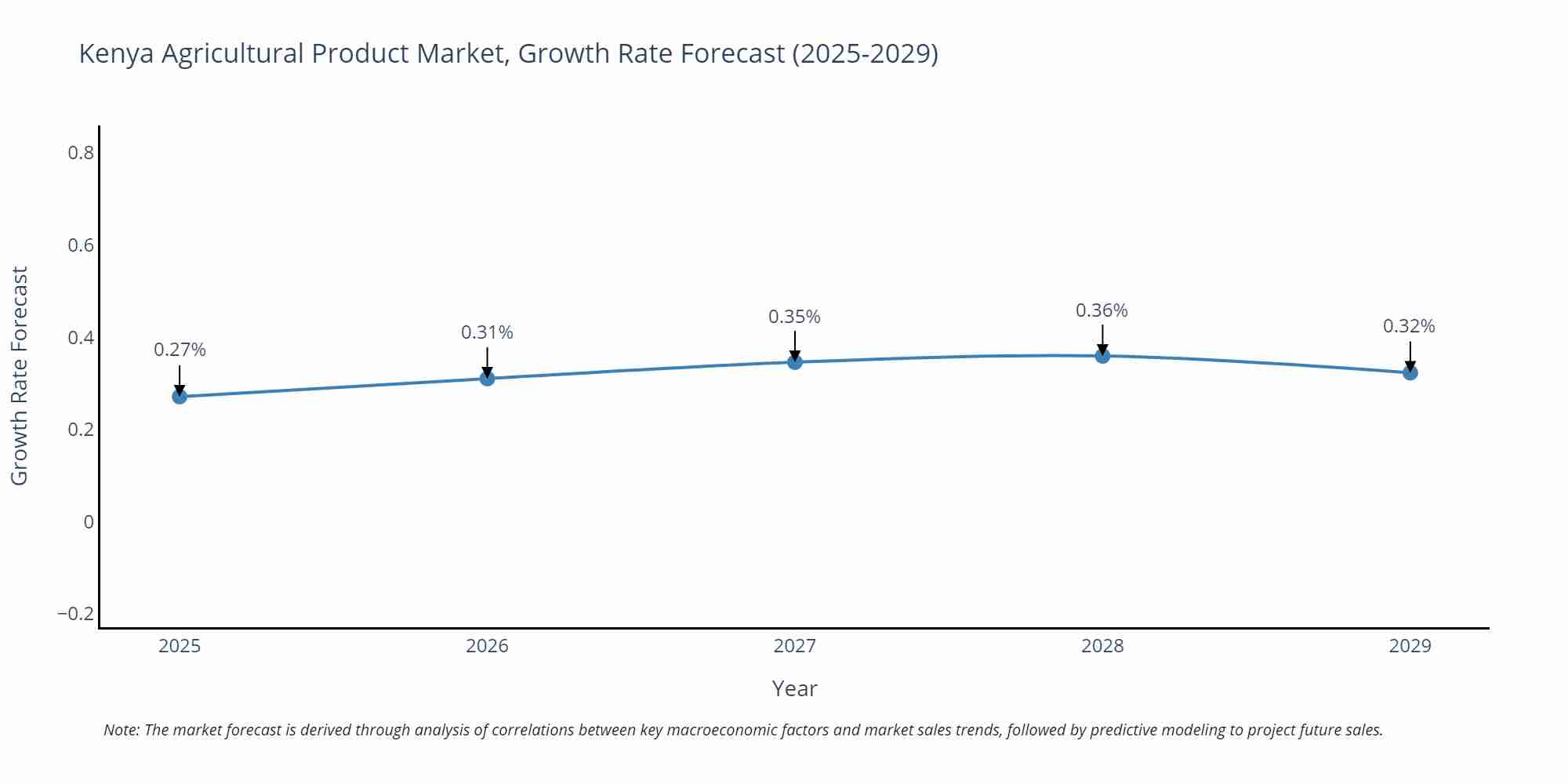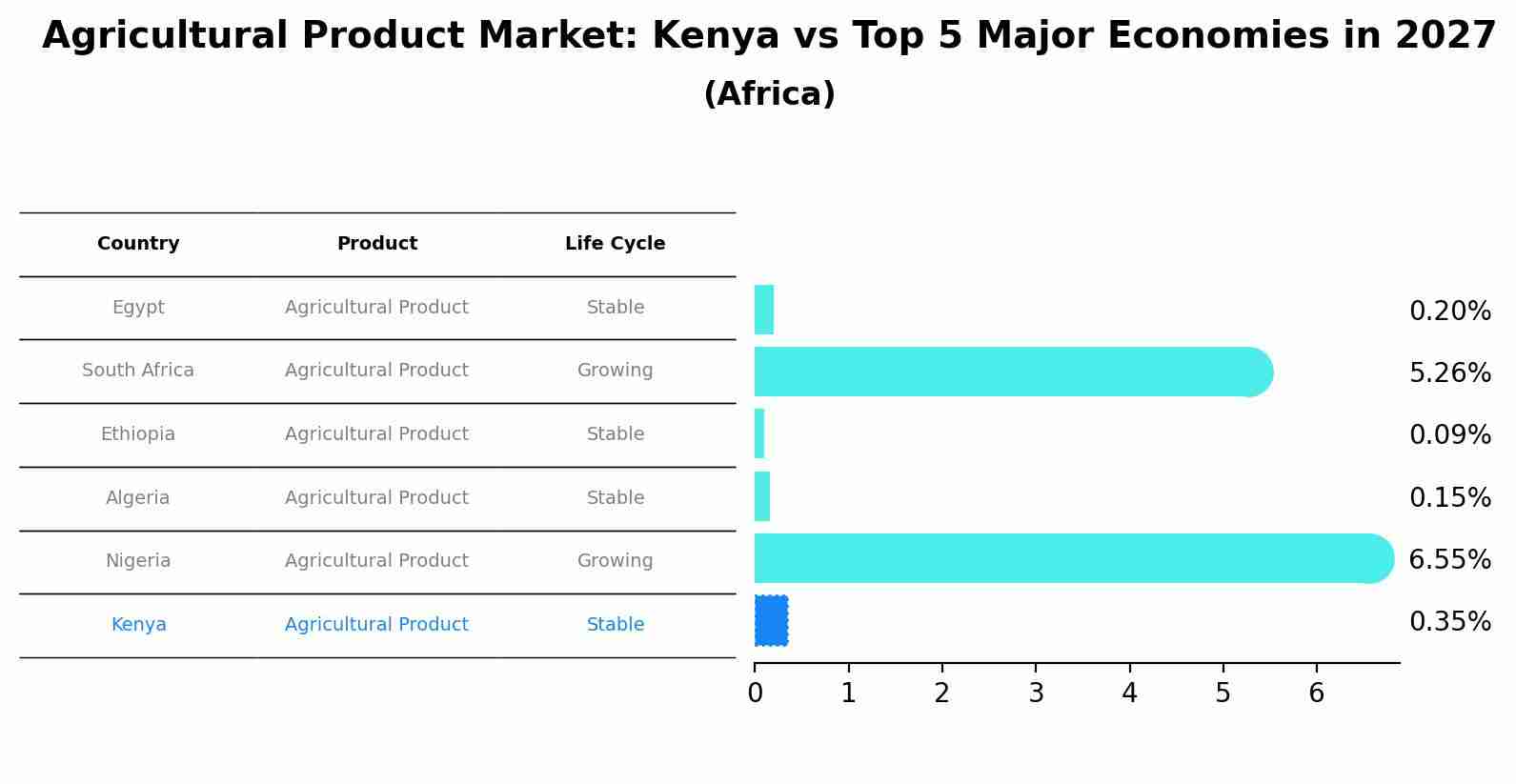Kenya Agricultural Product Market Outlook | Value, Growth, Analysis, COVID-19 IMPACT, Trends, Companies, Share, Forecast, Revenue, Size & Industry
| Product Code: ETC379670 | Publication Date: Aug 2022 | Updated Date: Jul 2025 | Product Type: Market Research Report | |
| Publisher: 6Wresearch | Author: Dhaval Chaurasia | No. of Pages: 75 | No. of Figures: 35 | No. of Tables: 20 |
Kenya Agricultural Product Market Size Growth Rate
The Kenya Agricultural Product Market is projected to witness mixed growth rate patterns during 2025 to 2029. Starting at 0.27% in 2025, the market peaks at 0.36% in 2028, and settles at 0.32% by 2029.

Agricultural Product Market: Kenya vs Top 5 Major Economies in 2027 (Africa)
In the Africa region, the Agricultural Product market in Kenya is projected to expand at a stable growth rate of 0.35% by 2027. The largest economy is Egypt, followed by South Africa, Ethiopia, Algeria and Nigeria.

Kenya Agricultural Product Market Synopsis
The Kenya Agricultural Product Market is a diverse and thriving sector that plays a crucial role in the country`s economy. The market consists of a wide range of products including fruits, vegetables, grains, livestock, and flowers. Major crops grown in Kenya include tea, coffee, maize, and horticultural products. The market is characterized by smallholder farmers as well as large commercial farms, with both traditional and modern farming practices being utilized. Kenya is also a leading exporter of agricultural products, particularly flowers and tea. The market faces challenges such as climate change, limited access to markets, and inadequate infrastructure. However, with government support, technological advancements, and growing demand for organic and ethically sourced products, the Kenya Agricultural Product Market continues to show promise for future growth and development.
Kenya Agricultural Product Market Trends
The Kenya Agricultural Product Market is experiencing several key trends. One major trend is the increasing adoption of technology in agriculture, such as the use of precision farming tools and mobile apps for crop management. This has helped farmers improve efficiency and productivity. Another trend is the growing demand for organic and sustainably produced agricultural products, driven by consumer preferences for healthier and environmentally-friendly options. Additionally, there is a rising interest in value-added products and agribusiness opportunities, with more farmers exploring processing and packaging to increase the value of their products. Overall, these trends indicate a shift towards more modern and sustainable practices in the Kenya Agricultural Product Market.
Kenya Agricultural Product Market Challenges
The Kenya Agricultural Product Market faces several challenges including inconsistent weather patterns leading to unpredictable crop yields, limited access to affordable financing for small-scale farmers, inadequate infrastructure for transportation and storage, as well as reliance on traditional farming methods that hinder productivity. Additionally, market access and distribution networks are often inefficient, resulting in high post-harvest losses. Lack of proper market information and price transparency also present hurdles for farmers in making informed decisions. Addressing these challenges will require investments in modernizing agricultural practices, improving rural infrastructure, facilitating access to credit, and enhancing market linkages to ensure sustainable growth and competitiveness in the Kenyan agricultural sector.
Kenya Agricultural Product Market Investment Opportunities
Investment opportunities in the Kenya Agricultural Product Market are diverse and promising. With a growing population and increasing demand for food products, there is potential for investment in various sectors such as precision farming technologies, agro-processing industries, and value-added products like organic foods and specialty crops. Additionally, investing in infrastructure and logistics to improve distribution networks and reduce post-harvest losses presents a profitable opportunity. Collaborating with smallholder farmers to improve their productivity through training, access to resources, and sustainable practices can also yield significant returns. Overall, the Kenya Agricultural Product Market offers a range of investment prospects for those looking to capitalize on the country`s agricultural potential and contribute to its economic development.
Jordan Agar Market Government Policies
The Kenyan government has implemented various policies to support the agricultural product market, including the Agriculture Sector Transformation and Growth Strategy, which aims to enhance productivity, value addition, and market access for farmers. Additionally, the National Agriculture Investment Plan focuses on promoting sustainable agricultural practices and improving access to markets for smallholder farmers. The government has also established the Agricultural Finance Corporation to provide financial support to farmers and agribusinesses. Furthermore, the National Crops Regulations aim to ensure quality standards and promote fair trade practices in the agricultural product market. Overall, these policies seek to drive growth in the agricultural sector, enhance food security, and increase farmers` income levels in Kenya.
Kenya Agricultural Product Market Future Outlook
The future outlook for the Kenya Agricultural Product Market appears promising, driven by various factors such as increasing demand for organic and sustainably produced food, government initiatives to support agricultural development, and technological advancements in farming practices. With a growing population and rising middle-class consumers, there is a need for diversified agricultural products to meet changing dietary preferences. Additionally, the focus on export-oriented agriculture and agribusiness is expected to boost market growth and create opportunities for value addition and market expansion. However, challenges such as climate change impacts, land degradation, and limited access to finance and infrastructure may hinder the sector`s full potential. Overall, the Kenya Agricultural Product Market is poised for growth and innovation, with a strong emphasis on sustainability and quality to meet domestic and international market demands.
Key Highlights of the Report:
- Kenya Agricultural Product Market Outlook
- Market Size of Kenya Agricultural Product Market, 2021
- Forecast of Kenya Agricultural Product Market, 2031
- Historical Data and Forecast of Kenya Agricultural Product Revenues & Volume for the Period 2018 - 2031
- Kenya Agricultural Product Market Trend Evolution
- Kenya Agricultural Product Market Drivers and Challenges
- Kenya Agricultural Product Price Trends
- Kenya Agricultural Product Porter's Five Forces
- Kenya Agricultural Product Industry Life Cycle
- Historical Data and Forecast of Kenya Agricultural Product Market Revenues & Volume By Type for the Period 2018 - 2031
- Historical Data and Forecast of Kenya Agricultural Product Market Revenues & Volume By Food for the Period 2018 - 2031
- Historical Data and Forecast of Kenya Agricultural Product Market Revenues & Volume By Fiber for the Period 2018 - 2031
- Historical Data and Forecast of Kenya Agricultural Product Market Revenues & Volume By Fuel for the Period 2018 - 2031
- Historical Data and Forecast of Kenya Agricultural Product Market Revenues & Volume By Raw Material for the Period 2018 - 2031
- Historical Data and Forecast of Kenya Agricultural Product Market Revenues & Volume By Application for the Period 2018 - 2031
- Historical Data and Forecast of Kenya Agricultural Product Market Revenues & Volume By Direct Consumption for the Period 2018 - 2031
- Historical Data and Forecast of Kenya Agricultural Product Market Revenues & Volume By Food & Fabrics for the Period 2018 - 2031
- Historical Data and Forecast of Kenya Agricultural Product Market Revenues & Volume By Construction & Paper Products for the Period 2018 - 2031
- Historical Data and Forecast of Kenya Agricultural Product Market Revenues & Volume By Others for the Period 2018 - 2031
- Historical Data and Forecast of Kenya Agricultural Product Market Revenues & Volume By Industry Vertical for the Period 2018 - 2031
- Historical Data and Forecast of Kenya Agricultural Product Market Revenues & Volume By Food & Nutrition for the Period 2018 - 2031
- Historical Data and Forecast of Kenya Agricultural Product Market Revenues & Volume By Sustainable Agribusiness for the Period 2018 - 2031
- Historical Data and Forecast of Kenya Agricultural Product Market Revenues & Volume By Production & Harvesting for the Period 2018 - 2031
- Historical Data and Forecast of Kenya Agricultural Product Market Revenues & Volume By Agribusiness Technological Inputs for the Period 2018 - 2031
- Historical Data and Forecast of Kenya Agricultural Product Market Revenues & Volume By Others for the Period 2018 - 2031
- Kenya Agricultural Product Import Export Trade Statistics
- Market Opportunity Assessment By Type
- Market Opportunity Assessment By Application
- Market Opportunity Assessment By Industry Vertical
- Kenya Agricultural Product Top Companies Market Share
- Kenya Agricultural Product Competitive Benchmarking By Technical and Operational Parameters
- Kenya Agricultural Product Company Profiles
- Kenya Agricultural Product Key Strategic Recommendations
Frequently Asked Questions About the Market Study (FAQs):
- Single User License$ 1,995
- Department License$ 2,400
- Site License$ 3,120
- Global License$ 3,795
Search
Thought Leadership and Analyst Meet
Our Clients
Related Reports
- Afghanistan Apparel Market (2026-2032) | Growth, Outlook, Industry, Segmentation, Forecast, Size, Companies, Trends, Value, Share, Analysis & Revenue
- Canada Oil and Gas Market (2026-2032) | Share, Segmentation, Value, Industry, Trends, Forecast, Analysis, Size & Revenue, Growth, Competitive Landscape, Outlook, Companies
- Germany Breakfast Food Market (2026-2032) | Industry, Share, Growth, Size, Companies, Value, Analysis, Revenue, Trends, Forecast & Outlook
- Australia Briquette Market (2025-2031) | Growth, Size, Revenue, Forecast, Analysis, Trends, Value, Share, Industry & Companies
- Vietnam System Integrator Market (2025-2031) | Size, Companies, Analysis, Industry, Value, Forecast, Growth, Trends, Revenue & Share
- ASEAN and Thailand Brain Health Supplements Market (2025-2031) | Strategy, Consumer Insights, Analysis, Investment Trends, Opportunities, Growth, Size, Share, Industry, Revenue, Segments, Value, Segmentation, Supply, Forecast, Restraints, Outlook, Competition, Drivers, Trends, Demand, Pricing Analysis, Competitive, Strategic Insights, Companies, Challenges
- ASEAN Bearings Market (2025-2031) | Strategy, Consumer Insights, Analysis, Investment Trends, Opportunities, Growth, Size, Share, Industry, Revenue, Segments, Value, Segmentation, Supply, Forecast, Restraints, Outlook, Competition, Drivers, Trends, Demand, Pricing Analysis, Competitive, Strategic Insights, Companies, Challenges
- Europe Flooring Market (2025-2031) | Outlook, Share, Industry, Trends, Forecast, Companies, Revenue, Size, Analysis, Growth & Value
- Saudi Arabia Manlift Market (2025-2031) | Outlook, Size, Growth, Trends, Companies, Industry, Revenue, Value, Share, Forecast & Analysis
- Uganda Excavator, Crane, and Wheel Loaders Market (2025-2031) | Strategy, Consumer Insights, Analysis, Investment Trends, Opportunities, Growth, Size, Share, Industry, Revenue, Segments, Value, Segmentation, Supply, Forecast, Restraints, Outlook, Competition, Drivers, Trends, Demand, Pricing Analysis, Competitive, Strategic Insights, Companies, Challenges
Industry Events and Analyst Meet
Whitepaper
- Middle East & Africa Commercial Security Market Click here to view more.
- Middle East & Africa Fire Safety Systems & Equipment Market Click here to view more.
- GCC Drone Market Click here to view more.
- Middle East Lighting Fixture Market Click here to view more.
- GCC Physical & Perimeter Security Market Click here to view more.
6WResearch In News
- Doha a strategic location for EV manufacturing hub: IPA Qatar
- Demand for luxury TVs surging in the GCC, says Samsung
- Empowering Growth: The Thriving Journey of Bangladesh’s Cable Industry
- Demand for luxury TVs surging in the GCC, says Samsung
- Video call with a traditional healer? Once unthinkable, it’s now common in South Africa
- Intelligent Buildings To Smooth GCC’s Path To Net Zero


















